Metaphysics involves intuitive knowledge of unprovable starting-points (concepts and truth) and demonstrative knowledge of what follows from them. (Aristotle, Metaphysics, 340BC) Demonstration is also something necessary, because a demonstration cannot go otherwise than it does, ... And the cause of this lies with the primary premises/principles. (Aristotle, Metaphysics) The first philosophy (Metaphysics) is universal and is exclusively concerned with primary substance. ... And here we will have the science to study that which is just as that which is, both in its essence and in the properties which, just as a thing that is, it has. (Aristotle, Metaphysics, 340BC) There must then be a principle of such a kind that its substance is activity. For those who wish to make good progress must start well; for subsequent progress depends on the resolution of the first puzzles, and one cannot solve these without knowing the difficulty and the confusion of our minds. So we must first set out all the difficulties, both for these reasons and also because those who inquire without first setting out the difficulties are like those who do not know in which direction they should walk, and in addition do not even know whether they would recognize that which they are looking for. For the end is not clear to these, but it is for those who have begun with the puzzles. And also from the point of view of judging that man is better off who has heard, as it were, all the rival and opposed positions. (Aristotle, Metaphysics) Reality cannot be found except in One single source, because of the interconnection of all things with one another. ... I maintain also that substances, whether material or immaterial, cannot be conceived in their bare essence without any activity, activity being of the essence of substance in general. (Leibniz, 1670) It is a good thing to proceed in order and to establish propositions (principles). This is the way to gain ground and to progress with certainty. ... I hold that the mark of a genuine idea is that its possibility can be proved, either a priori by conceiving its cause or reason, or a posteriori when experience teaches us that it is a fact in nature. Indeed in general I hold that there is nothing truer than happiness, and nothing happier and sweeter than truth. (Leibniz, 1670) I agree with you that it is important to examine our presuppositions, thoroughly and once for all, in order to establish something solid. For I hold that it is only when we can prove all that we bring forward that we perfectly understand the thing under consideration. I know that the common herd takes little pleasure in these researches, but I know also that the common herd take little pains thoroughly to understand things. (Leibniz, 1670) But it is the knowledge of necessary and eternal truths which distinguishes us from mere animals, and gives us reason and the sciences, raising us to knowledge of ourselves and God. It is this in us which we call the rational soul or mind. (Leibniz, 1670) When a truth is necessary, the reason for it can be found by analysis, that is, by resolving it into simpler ideas and truths until the primary ones are reached. It is this way that in mathematics speculative theorems and practical canons are reduced by analysis to definitions, axioms and postulates. (Leibniz, 1670) When we look about us towards external objects, and consider the operation of causes, we are never able, in a single instance, to discover any power or necessary connexion; any quality, which binds the effect to the cause, and renders the one an infallible consequence of the other. (Hume, 1737) ... experience only teaches us, how one event constantly follows another; without instructing us in the secret connexion, which binds them together, and renders them inseparable. (Hume, 1737) We then call the one object, Cause; the other, Effect. We suppose that there is some connexion between them; some power in the one, by which it infallibly produces the other, and operates with the greatest certainty and strongest necessity. (Hume, 1737) This can never become popular, and, indeed, has no occasion to be so; for fine-spun arguments in favour of useful truths make just as little impression on the public mind as the equally subtle objections brought against these truths. On the other hand, since both inevitably force themselves on every man who rises to the height of speculation, it becomes the manifest duty of the schools to enter upon a thorough investigation of the rights of speculative reason, and thus to prevent the scandal which metaphysical controversies are sure, sooner or later, to cause even to the masses. (Immanuel Kant, Critique of Pure Reason, 1781) Note: This is a summary from the main Principles in Physics page (which is very good). All logic depends upon Principles which gives rise to necessary consequences that are absolute and certain (rather than mere opinions). The aim of Science is to demonstrate that these logical deductions from (a priori) Principles exactly correspond with our sense of the real world from (a posteriori) observation and experiment. Albert Einstein explains this Scientific method very clearly; The development during the present century is characterized by two theoretical systems essentially independent of each other: the theory of relativity and the quantum theory. The two systems do not directly contradict each other; but they seem little adapted to fusion into one unified theory. For the time being we have to admit that we do not possess any general theoretical basis for physics which can be regarded as its logical foundation. (Albert Einstein, 1940) If, then, it is true that the axiomatic basis of theoretical physics cannot be extracted from experience but must be freely invented, can we ever hope to find the right way? I answer without hesitation that there is, in my opinion, a right way, and that we are capable of finding it. I hold it true that pure thought can grasp reality, as the ancients dreamed. (Albert Einstein, 1954) 'We all start from naive realism, i.e., the doctrine that things are what they seem. We think that grass is green, that stones are hard, and that snow is cold. But physics assures us that the greenness of grass, the hardness of stones, and the coldness of snow are not the greenness, hardness, and coldness that we know in our own experience, but something very different. The observer, when he seems to himself to be observing a stone, is really, if physics is to be believed, observing the effects of the stone upon himself.' Gradually the conviction gained recognition that all knowledge about things is exclusively a working-over of the raw material furnished by the senses. Galileo and Hume first upheld this principle with full clarity and decisiveness. Hume saw that concepts which we must regard as essential, such as, for example, causal connection, cannot be gained from material given to us by the senses. This insight led him to a skeptical attitude as concerns knowledge of any kind. Man has an intense desire for assured knowledge. That is why Hume's clear message seemed crushing: the sensory raw material, the only source of our knowledge,through habit may lead us to belief and expectation but not to the knowledge and still less to the understanding of lawful relations. Then Kant took the stage with an idea which, though certainly untenable in the form in which he put it, signified a step towards the solution of Hume's dilemma: whatever in knowledge is of empirical origin is never certain. If, therefore, we have definitely assured knowledge,it must be grounded in reason itself. This is held to be the case, for example, in the propositions of geometry and the principles of causality. These and certain other types of knowledge are, so to speak, a part of the implements of thinking and therefore do not previously have to be gained from sense data (i.e. they are a priori knowledge). As soon as one is at home in Hume's critique one is easily led to believe that all those concepts and propositions which cannot be deduced from the sensory raw material are, on account of their 'metaphysical' character, to be removed from thinking. For all thought acquires material content only through its relationship with that sensory material. This latter proposition I take to be entirely true; but I hold the prescription for thinking which is grounded on this proposition to be false. For this claim- if only carried through consistently- absolutely excludes thinking of any kind as 'metaphysical'. By his clear critique Hume did not only advance philosophy in a decisive way but also - though through no fault of his - created a danger for philosophy in that, following his critique, a fateful 'fear of metaphysics' arose which has come to be a malady of contemporary empiricist philosophising; this malady is the counterpart to that earlier philosophising in the clouds, which thought it could neglect and dispense with what was given by the senses. ... It finally turns out that one can, after all, not get along without metaphysics.Aristotle Metaphysics
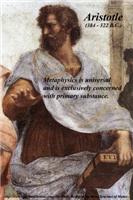 It is clear, then, that wisdom is knowledge having to do with certain principles and causes. But now, since it is this knowledge that we are seeking, we must consider the following point: of what kind of principles and of what kind of causes is wisdom the knowledge? (Aristotle, Metaphysics, 340BC)
It is clear, then, that wisdom is knowledge having to do with certain principles and causes. But now, since it is this knowledge that we are seeking, we must consider the following point: of what kind of principles and of what kind of causes is wisdom the knowledge? (Aristotle, Metaphysics, 340BC)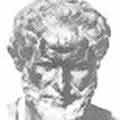 The entire preoccupation of the physicist is with things that contain within themselves a principle of movement and rest. And to seek for this is to seek for the second kind of principle, that from which comes the beginning of the change. (Aristotle, Metaphysics, 340BC)
The entire preoccupation of the physicist is with things that contain within themselves a principle of movement and rest. And to seek for this is to seek for the second kind of principle, that from which comes the beginning of the change. (Aristotle, Metaphysics, 340BC)
... it is impossible that the primary existent, being eternal, should be destroyed.
... that among entities there must be some cause which moves and combines things.
... about its coming into being and its doings and about all its alterations we think that we have knowledge when we know the source of its movement. (Aristotle, Metaphysics, 340BC)Gottfried Leibniz on Metaphysics (Monadology)

(Gottfried Leibniz, 1670)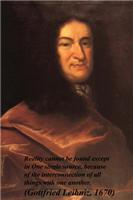 ... a distinction must be made between true and false ideas, and that too much rein must not be given to a man's imagination under pretext of its being a clear and distinct intellection. (Leibniz, 1670)
... a distinction must be made between true and false ideas, and that too much rein must not be given to a man's imagination under pretext of its being a clear and distinct intellection. (Leibniz, 1670)David Hume Metaphysics Quotes: On Causation / Necessary Connection
 It must certainly be allowed, that nature has kept us at a great distance from all her secrets, and has afforded us only the knowledge of a few superficial qualities of objects; while she conceals from us those powers and principles on which the influence of those objects entirely depends. (Hume, 1737)
It must certainly be allowed, that nature has kept us at a great distance from all her secrets, and has afforded us only the knowledge of a few superficial qualities of objects; while she conceals from us those powers and principles on which the influence of those objects entirely depends. (Hume, 1737)Immanuel Kant Quotes on Metaphysics
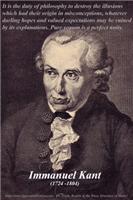 Time was, when she (Metaphysics) was the queen of all the sciences; and, if we take the will for the deed, she certainly deserves, so far as regards the high importance of her object-matter, this title of honour. Now, it is the fashion of the time to heap contempt and scorn upon her; and the matron mourns, forlorn and forsaken, like Hecuba .. her empire gradually broke up, and intestine wars introduced the reign of anarchy; while the sceptics, like nomadic tribes, who hate a permanent habitation and settled mode of living, attacked from time to time those who had organized themselves into civil communities. But their number was, very happily, small; and thus they could not entirely put a stop to the exertions of those who persisted in raising new edifices, although on no settled or uniform plan. (Immanuel Kant, Critique of Pure Reason, 1781)
Time was, when she (Metaphysics) was the queen of all the sciences; and, if we take the will for the deed, she certainly deserves, so far as regards the high importance of her object-matter, this title of honour. Now, it is the fashion of the time to heap contempt and scorn upon her; and the matron mourns, forlorn and forsaken, like Hecuba .. her empire gradually broke up, and intestine wars introduced the reign of anarchy; while the sceptics, like nomadic tribes, who hate a permanent habitation and settled mode of living, attacked from time to time those who had organized themselves into civil communities. But their number was, very happily, small; and thus they could not entirely put a stop to the exertions of those who persisted in raising new edifices, although on no settled or uniform plan. (Immanuel Kant, Critique of Pure Reason, 1781)Albert Einstein on Principles in Physics
 (Albert Einstein) Physics constitutes a logical system of thought which is in a state of evolution, whose basis (principles) cannot be distilled, as it were, from experience by an inductive method, but can only be arrived at by free invention. The justification (truth content) of the system rests in the verification of the derived propositions (a priori/logical truths) by sense experiences (a posteriori/empirical truths). ... Evolution is proceeding in the direction of increasing simplicity of the logical basis (principles). .. We must always be ready to change these notions - that is to say, the axiomatic basis of physics - in order to do justice to perceived facts in the most perfect way logically. (Albert Einstein, Physics and Reality, 1936)
(Albert Einstein) Physics constitutes a logical system of thought which is in a state of evolution, whose basis (principles) cannot be distilled, as it were, from experience by an inductive method, but can only be arrived at by free invention. The justification (truth content) of the system rests in the verification of the derived propositions (a priori/logical truths) by sense experiences (a posteriori/empirical truths). ... Evolution is proceeding in the direction of increasing simplicity of the logical basis (principles). .. We must always be ready to change these notions - that is to say, the axiomatic basis of physics - in order to do justice to perceived facts in the most perfect way logically. (Albert Einstein, Physics and Reality, 1936)Albert Einstein Quotes on Metaphysics
(Remarks on Bertrand Russell's Theory of Knowledge, 1954)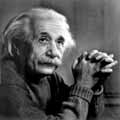 In the evolution of philosophical thought through the centuries the following question has played a major role: what knowledge is pure thought able to supply independently of sense perception? Is there any such knowledge? If not, what precisely is the relation between our knowledge and the raw material furnished by sense impressions?
In the evolution of philosophical thought through the centuries the following question has played a major role: what knowledge is pure thought able to supply independently of sense perception? Is there any such knowledge? If not, what precisely is the relation between our knowledge and the raw material furnished by sense impressions?
There has been an increasing skepticism concerning every attempt by means of pure thought to learn something about the 'objective world', about the world of'things' in contrast to the world of 'concepts and ideas'. During philosophy's childhood it was rather generally believed that it is possible to find everything which can be known by means of mere reflection. It was an illusion which anyone can easily understand if, for a moment, he dismisses what he has learned from later philosophy and from natural science; he will not be surprised to find that Plato ascribed a higher reality to 'ideas' than to empirically experienceable things. Even in Spinoza and as late as in Hegel this prejudice was the vitalising force which seems still to have played the major role.
The more aristocratic illusion concerning the unlimited penetrative power of thought has as its counterpart the more plebeian illusion of naive realism, according to which things 'are' as they are perceived by us through our senses. This illusion dominates the daily life of men and of animals; it is also the point of departure in all of the sciences, especially of the natural sciences.
As Russell wrote;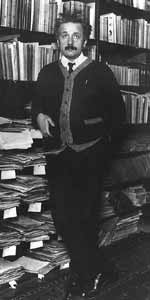 Today everyone knows, of course, that the mentioned concepts contain nothing of the certainty, of the inherent necessity, which Kant had attributed to them. The following, however, appears to me to be correct in Kant's statement of the problem: in thinking we use with a certain "right", concepts to which there is no access from the materials of sensory experience, if the situation is viewed from the logical point of view. As a matter of fact, I am convinced that even much more is to be asserted: the concepts which arise in our thought and in our linguistic expressions are all- when viewed logically- the free creations of thought which cannot inductively be gained from sense experiences. This is not so easily noticed only because we have the habit of combining certain concepts and conceptual relations (propositions) so definitely with certain sense experiences that we do not become conscious of the gulf- logically unbridgeable- which separates the world of sensory experiences from the world of concepts and propositions. Thus, for example, the series of integers is obviously an invention of the human mind, a self-created tool which simplifies the ordering of certain sensory experiences. But there is no way in which this concept could be made to grow, as it were, directly out of sense experiences.
Today everyone knows, of course, that the mentioned concepts contain nothing of the certainty, of the inherent necessity, which Kant had attributed to them. The following, however, appears to me to be correct in Kant's statement of the problem: in thinking we use with a certain "right", concepts to which there is no access from the materials of sensory experience, if the situation is viewed from the logical point of view. As a matter of fact, I am convinced that even much more is to be asserted: the concepts which arise in our thought and in our linguistic expressions are all- when viewed logically- the free creations of thought which cannot inductively be gained from sense experiences. This is not so easily noticed only because we have the habit of combining certain concepts and conceptual relations (propositions) so definitely with certain sense experiences that we do not become conscious of the gulf- logically unbridgeable- which separates the world of sensory experiences from the world of concepts and propositions. Thus, for example, the series of integers is obviously an invention of the human mind, a self-created tool which simplifies the ordering of certain sensory experiences. But there is no way in which this concept could be made to grow, as it were, directly out of sense experiences.
In order that thinking might not degenerate into 'metaphysics', or into empty talk, it is only necessary that enough propositions of the conceptual system be firmly enough connected with sensory experiences and that the conceptual system, in view of its task of ordering and surveying sense experience, should show as much unity and parsimony as possible. Beyond that, however, the 'system' is (as regards logic) a free play with symbols according to (logically) arbitrarily given rules of the game. All this applies as much (and in the same manner) to the thinking in daily life as to the more consciously and systematically constructed thinking in the sciences.
(Albert Einstein, Remarks on Bertrand Russell's Theory of Knowledge, Ideas and Opinions, 1954)
Tuesday, January 5, 2010
Metaphysics Quotes: On Truth, Reality & Principles in Science
Posted by indiakurry at 12:19 AM
Labels: Metaphysics
Subscribe to:
Post Comments (Atom)
0 comments:
Post a Comment